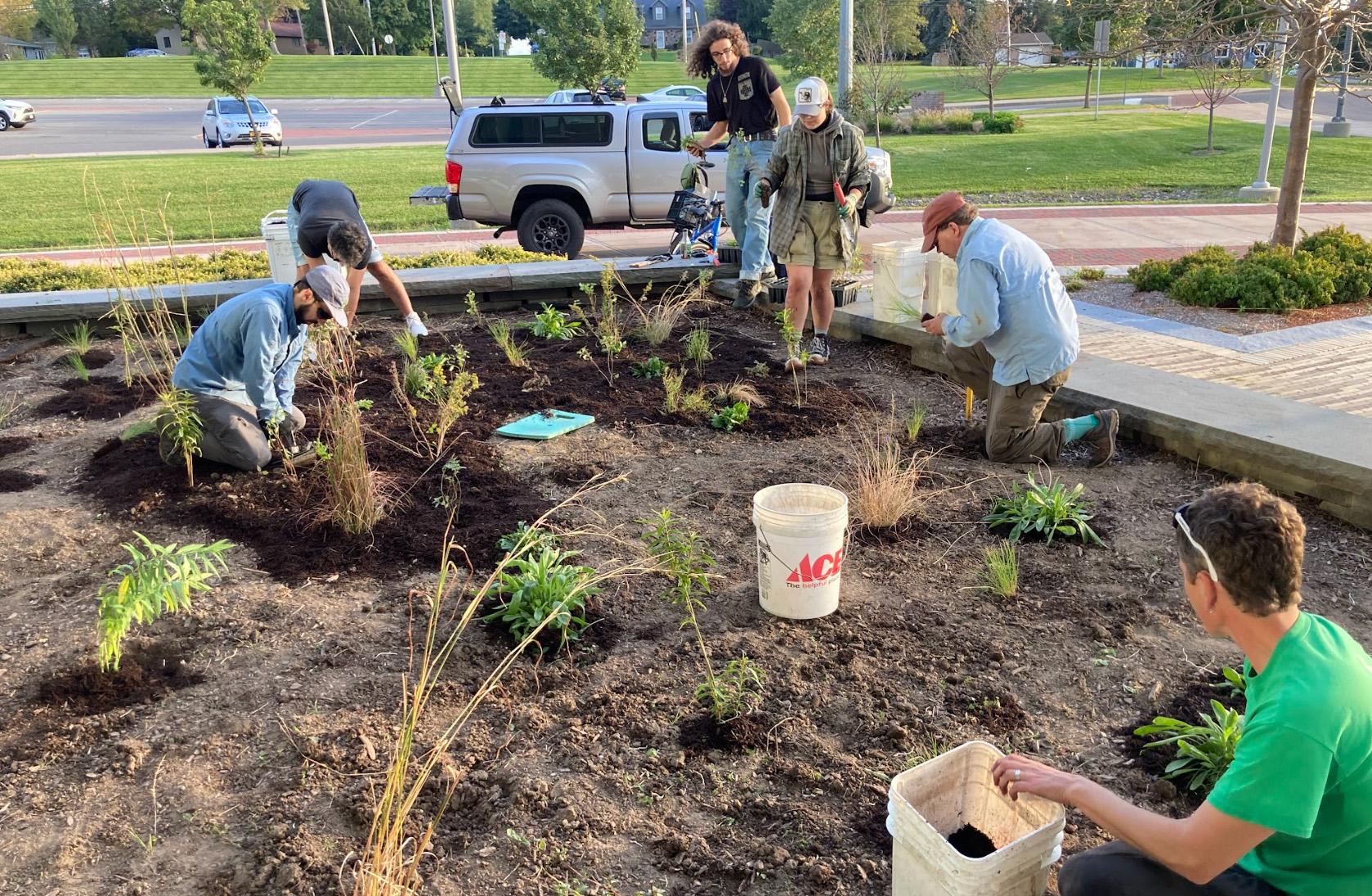While SUNY Oswego recently joined the Bee Campus USA program to protect pollinators, work in this field has been ongoing. Shown planting in the university Alvar Garden west of the Shineman Center are, from left, volunteer Sam Beguin, faculty member Mihai Paraschiv, students Daniel Ressue and E.J. Seale, faculty member Eric Hellquist and Kate Spector, SUNY Oswego sustainability director.
SUNY Oswego has become an affiliate of the Bee Campus USA program, designed to marshal the strengths of educational campuses for the benefit of pollinators. Oswego joins many other cities and campuses across the country united in improving their landscapes for pollinators.
“Like any great sustainability initiative, Bee Campus USA thinks globally and acts locally,” said Kate Spector, sustainability director at SUNY Oswego. “The program provides a framework for communities to come together to conserve native pollinators by providing a healthy habitat rich in a variety of native plants, furnishing nest sites and protecting pollinators from pesticides. Plants and insects are the foundation of a healthy ecosystem.”
Earning this designation builds upon and expands the efforts of the university’s Rice Creek Field Station, said Rice Creek’s assistant director, Kristen Haynes.
“Our certification holds us accountable to commitments that support pollinators, while also creating greater visibility at Rice Creek and the main campus about the importance of supporting pollinators and inspiring others to take action,” Haynes explained.
“I see becoming a Bee Campus USA as beneficial in multiple ways: it recognizes great work that was already being done to benefit pollinators, it reaffirms our campus commitment to stewarding our lakeshore habitat, it encourages us to continually improve our practices and it helps us spread awareness among our campus community and the general public,” Haynes said. “In short, it places us as regional leaders in ecological restoration and green landscaping practices.”
The application was stewarded by the university’s Campus Environmental Action Committee (CEAC), Office of Sustainability and Rice Creek Field Station. CEAC promotes environmental stewardship and sustainability by supporting the integration of environmental issues into the curriculum as well as by supporting and sponsoring events to increase environmental awareness and best practices on campus.
Supporting healthy habitats
“Rice Creek has already been taking steps to support healthy habitats for pollinators and other wildlife, and this designation will bring that work to the forefront,” Haynes said. “As our property has transitioned from agricultural fields to forest over several decades, we have chosen to maintain certain open areas, and mowed on a rotational basis to create meadows that can support, among other species, pollinators.”
The designation dovetails with what Haynes describes as a new movement in landscaping, “one that recognizes that we should not build landscapes solely with humans in mind.”
“With some changes, landscapes can support people and wildlife and a healthy ecosystem,” Haynes said. “Bee Campus USA is a signal of our commitment to this new kind of landscaping. This kind features local and native grasses, trees, shrubs and flowers that serve as the base of healthy food chains (including pollinators). It encourages sustainable garden practices like eliminating the use of chemical pesticides and fertilizers wherever possible, and no use of supplemental watering once plants are established.”
The designation also aligns with efforts among Oswego’s academic offerings.
Biological sciences faculty member Eric Hellquist involved his BIO 320 “Introduction to Ecology” laboratory students in service learning related to the Bee Campus effort. His class, along with Sustainability Office interns, helped remove invasive Japanese barberry shrubs in front of Mary Walker Health Center, replacing them with native shrubs and perennial plants including Oswego tea, spicebush, winterberry, silky dogwood and buttonbush, Haynes noted. They also contributed to creating an Alvar Garden, converting an empty spot near the Shineman Center into a thriving example of a globally rare, Great Lakes-associated community.
Beyond classes, many members of the campus community are already involved in these efforts, including faculty, staff and student researchers and interns.
Haynes stressed that bees are not primarily the pests some might think they are. Supporting these species in ways large and small, from purposeful landscape planning to installing pollinator beds can make a big difference in preserving the ecosystem.
“Much of our food system depends on these pollinators, yet due largely to habitat loss, climate change, pesticide use and invasive species, 40 percent have severely declined in population size and are at risk of extinction,” Haynes said. “By and large, these pollinators are completely non-aggressive toward people when they are foraging for nectar and pollen in pollinator beds.”
About the designation
Bee Campus USA is an initiative of the Xerces Society for Invertebrate Conservation, a nonprofit organization based in Portland, Oregon, with offices across the country. The effort’s mission is to galvanize communities and campuses to sustain pollinators by providing them with healthy habitats, rich in a variety of native plants, and free of pesticides.
Pollinators like bumble bees, sweat bees, mason bees, honey bees, butterflies, moths, beetles, flies, hummingbirds and many others are responsible for the reproduction of almost 90 percent of the world's flowering plant species and one in every three bites of food humans consume, program organizers said.
“The program aspires to make people more PC — pollinator conscious, that is,” said Scott Hoffman Black, Xerces’ executive director. “If lots of individuals and communities begin planting native, pesticide-free flowering trees, shrubs and perennials, it will help to sustain many, many species of pollinators.”
“How each city or campus completes the steps to conserve pollinators is up to them,” said Bee Campus USA coordinator Laura Rost. “Affiliates play to their own strengths, designing pesticide reduction plans, improving habitat and holding events ranging from garden tours to native plant giveaways to bee trivia nights. Each campus must renew their affiliation each year and report on accomplishments from the previous year. Other institutions of higher education are invited to explore completing the application process outlined at beecityusa.org.”




